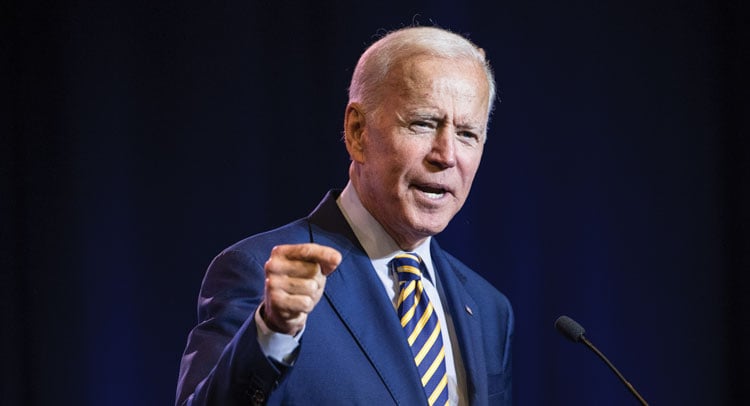Biden has an opportunity to reform and diversify federal courts

Shutterstock
America’s third branch of government has been at the epicenter of the news cycle in recent years, with the death of Justice Ruth Bader Ginsburg, high-profile battles over U.S. Supreme Court nominations, and controversy over election results putting the power and influence of the bench into full focus.
We have seen that courts can be an instrument for social and political change; they can be the sword and the shield. But they best serve justice when they are inclusive—a perennial challenge for the federal judiciary.
 Liane Jackson
Liane JacksonConservative strategists early on recognized the power potential of seeding the courts with like-minded ideologues and have been playing the long game for years. Sen. Mitch McConnell, R-Ky, with assistance from the Federalist Society and other right-wing groups, has been able to stack the federal judiciary with conservative judges. After Republicans gained control of the Senate in 2015, then-Majority Leader McConnell blocked more than 70% of then-President Barack Obama’s judicial nominations—including Supreme Court choice Merrick Garland—in order to preserve judicial picks for a Republican president. And once the presidency was secured, McConnell was able to push through hundreds of far right-aligned judges at a record pace, including three Supreme Court justices. The senator’s promise to “leave no vacancy behind” was implemented with ruthless speed and devastating consequences for diversity in the courts.
By the end of his term, former President Donald Trump had appointed more than 200 Article III judges, a class with the dubious distinction of being the least diverse pool in the modern era.
A left-out legacy
Instead of reflecting America’s melting pot, architects of this judicial reshaping sought candidates who evinced extreme right-wing philosophies, even when they lacked experience or had troubling commentary in their pasts.
Trump-appointed judges were overwhelmingly white, male and conservative: More than 76% were men and 84% were white, according to data collected by the American Constitution Society. Comparatively, 58% of Obama’s appointees were male and 64% were white. While Obama holds the record for the most diverse appointments to the federal bench, past presidents from all parties have made at least a de minimis effort to reflect gender and ethnic diversity in their appointments. But not the Trump administration.
Why should this matter? Because judges are not blank slates—their biases, ideologies and professional and life experiences influence how they rule, whether it’s on voting rights, reproductive choice, criminal justice, religion, immigration, the environment, labor issues or gun control. The judiciary holds an incredible and underappreciated sway over daily life. And lifetime appointments mean decades of opportunity to protect rights or rescind them.
In January, President Joe Biden began selecting members for a promised bipartisan commission to study reforms to the Supreme Court and the federal bench. He has said he wants the group to craft recommendations within 180 days.
Biden has been circumspect about Supreme Court reforms, a priority for progressives who have proposed everything from expanding the number of justices to term limits. The president has been on the record saying he’s “not a fan of court packing,” but activists are urging bold and swift action while the ball is in their court with a narrow Democratic Senate majority. To this end, the administration is actively seeking recommendations from senators and interest groups to fill outstanding judicial openings and any that may arise.
Neutral arbiters?
The judiciary relies on the public trust for legitimacy and viability. Courts remain more popular than other governmental institutions, but political polarization has begun eroding respect for the judicial branch.
A lack of diversity sends the wrong message to constituents and can undermine public confidence in the judiciary. In its October 2019 report Building a More Inclusive Federal Judiciary, the Center for American Progress noted the public increasingly perceives the courts as unfair, especially to underrepresented groups, and sees corporations as favored over the public good. The authors note that the judiciary is facing a legitimacy crisis, in part because of the “lack of federal judges representing historically underrepresented groups, such as people of color, women, individuals who self-identify as LGBTQ, people with disabilities, and people belonging to minority religions.”
Across the federal judiciary, there is a glaring dearth of Black women, with only five of 179 sitting on appeals courts and just 42 of 673 serving at the district court level. For his part, Biden has pledged to nominate a Black woman to the Supreme Court.
Prioritizing diversity
Homogeneity has never been a hallmark of justice. The regression of the Trump years can be reversed through a sweeping and concerted recruitment effort that expands the staid and narrow old boys’ network that feeds the judiciary. Most federal judges are pulled from private practice or are former prosecutors, but Biden’s commission must cast a wide net to include more law professors, leaders of civil rights organizations, public defenders and nonprofit heads in the pool of nominees. Not only are these candidates well-qualified, but they will contribute well-needed diversity of intellectual thought and experience.
Historically underrepresented groups should be prioritized, along with a focus on bolstering the pipeline that starts in law school and includes judicial clerkships.
Federal judgeships should not be the province of the white-shoe elite—qualified candidates can be found at all levels of the educational and legal landscapes. As the Center for American Progress notes: “Adding judges with different backgrounds and experiences to the court can act as a check on bias in the courtroom.”
The Biden administration currently has five circuit court openings to fill. And more than 200 federal judges are currently eligible for senior status, more than half of whom are white males.
This moment offers an opportunity to recast the courts to reflect and understand the communities they serve. There is no lack of talent—all it takes is political will.
Intersection is a column that explores issues of race, gender and law across America’s criminal and social justice landscape.
Write a letter to the editor, share a story tip or update, or report an error.


